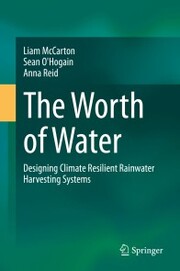-
Zusatztext
-
<p><p>There is no more fundamental substance to life on earth than water. Three quarter of the Earths surface is covered by either saltwater or freshwater, yet millions face a daily struggle to access enough water for survival. The effects of ongoing climate change have expanded the water crisis to areas previously considered water secure. This book addresses the role rainwater harvesting (rwh) can play in developing a resilient water infrastructure that will prove adaptive to climate change. The book features three sections.The first section presents the concepts underpinning a new approach to water infrastructure. The term the worth of water was developed to reflect the importance of the social life of water. This encompasses all human relationships with water including the social, cultural, hydrological, political, economic, technical and spiritual. A technology portfolio showcasing the worth of water from the Qanats of the ancient world to the modern Rain Cities is presented. Other concepts discussed include the circular economy of water and the concept of multiple waters for multiple users of multiple qualities. Water and its properties are a function of its peculiar molecular structure and this is illustrated in the book. Rainwater harvesting is considered by the authors as containing an inherent treatment train which functions as a complex water treatment system providing physical, chemical and biological removal mechanisms. Part two presents a new design methodology together with design templates and worked examples for the hydraulic and economic analysis of rwh systems. A state-of-the-art literature review of the potential health implications of utilizing rwh is also presented. The final section of the book discusses how rwh can play a vital role in contributing to achieving the Sustainable Development Goals and to living within the Planetary Boundaries.</p></p>
-
-
Kurztext
-
There is no more fundamental substance to life on earth than water. Three quarter of the Earth's surface is covered by either saltwater or freshwater, yet millions face a daily struggle to access enough water for survival. The effects of ongoing climate change have expanded the water crisis to areas previously considered water secure. This book addresses the role rainwater harvesting (rwh) can play in developing a resilient water infrastructure that will prove adaptive to climate change. The book features three sections. The first section presents the concepts underpinning a new approach to water infrastructure. The term "e;the worth of water"e; was developed to reflect the importance of the social life of water. This encompasses all human relationships with water including the social, cultural, hydrological, political, economic, technical and spiritual. A technology portfolio showcasing the worth of water from the Qanats of the ancient world to the modern Rain Cities is presented. Other concepts discussed include the circular economy of water and the concept of multiple waters for multiple users of multiple qualities. Water and its properties are a function of its peculiar molecular structure and this is illustrated in the book. Rainwater harvesting is considered by the authors as containing an inherent treatment train which functions as a complex water treatment system providing physical, chemical and biological removal mechanisms. Part two presents a new design methodology together with design templates and worked examples for the hydraulic and economic analysis of rwh systems. A state-of-the-art literature review of the potential health implications of utilizing rwh is also presented. The final section of the book discusses how rwh can play a vital role in contributing to achieving the Sustainable Development Goals and to living within the Planetary Boundaries.
-
-
Autorenportrait
- <p>Dr. Liam McCarton is a lecturer in the School of Civil& Structural Engineering at Technological University Dublin. He is Director of Engineers Without Borders, Ireland. He is experienced with over twenty five years of lecturing, international development program management, environmental engineering design and commissioning of water and sanitation, and education and health infrastructure projects.</p><p>Dr. Sean OHogain is a lecturer in the School of Civil& Structural Engineering at Technological University Dublin, specialising in water and wastewater analysis. His research topics have included Reed beds, Rainwater Harvesting and International Development, and he has conducted research projects in Ireland, Latin America and Africa.<br></p><p>Anna Reid is a Senior Technical Officer in the School of Civil& Structural Engineering at Technological University Dublin. She is in charge of the supervision, coordination, direction and administration of assigned Technicians and Technical Officers, and is currently pursuing research in sustainable water supply/rainwater harvesting. </p>
Detailansicht
The Worth of Water
eBook - Designing Climate Resilient Rainwater Harvesting Systems
ISBN/EAN: 9783030506056
Umbreit-Nr.: 189708
Sprache:
Englisch
Umfang: 0 S., 13.54 MB
Format in cm:
Einband:
Keine Angabe
Erschienen am 09.11.2020
Auflage: 1/2020
E-Book
Format: PDF
DRM: Digitales Wasserzeichen


